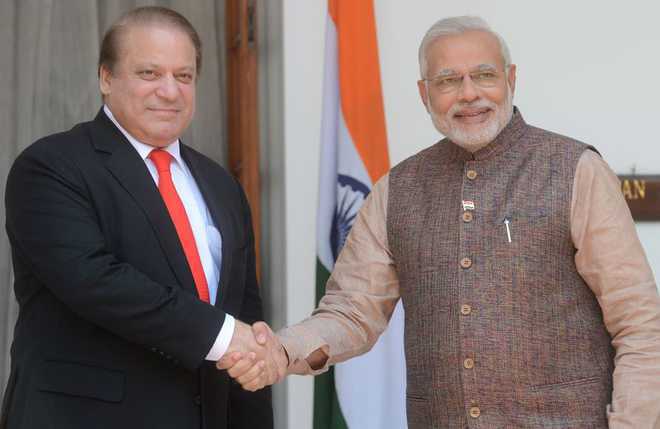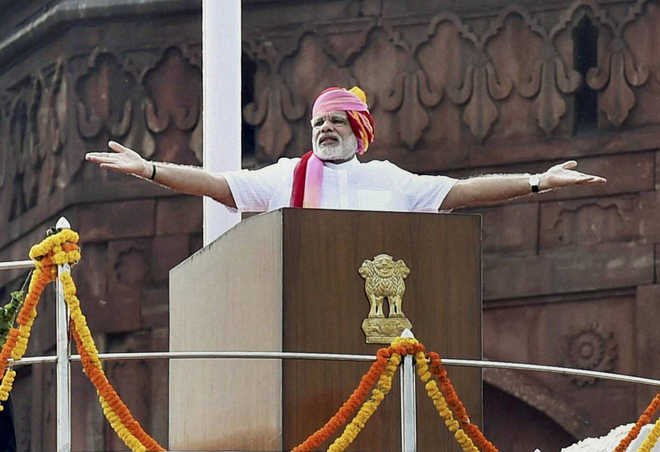
Prime Minister Narendra Modi and his Pakistan counterpart Nawaz Sharif. — File photo
Islamabad, August 15
Pakistan on Monday invited India for talks on Kashmir, saying it is the “international obligation” of both the countries to resolve the issue, notwithstanding India’s insistence that it would talk on “contemporary and relevant” issues in Indo-Pak relations.Foreign Office spokesman Nafees Zakaria said in a statement that Indian High Commissioner Gautam Bambawale was called to hand over a letter of invitation for talks.(Follow The Tribune on Facebook; and Twitter @thetribunechd)“The Foreign Secretary called in the Indian High Commissioner this afternoon (15 August 2016) and handed over a letter addressed to his Indian counterpart, inviting him to visit Pakistan for talks on Jammu and Kashmir dispute that has been the main bone of contention between India and Pakistan,” Zakaria said.The invitation was extended amid tension in bilateral ties due to the war of words between the two nations over the issue.”The letter highlights the international obligation of both the countries, India and Pakistan, to resolve the Jammu and Kashmir dispute, in accordance with the UN Security Council resolutions,” the statement said.Pakistan’s adviser on foreign affairs said last week that a conference of envoys of Pakistan earlier this month had agreed that Pakistan seek talks with India.The invite came days after Union Home Minister Rajnath Singh addressed Parliament on the Kashmir issue and said that India was willing to discuss only Pakistan-occupied Kashmir (PoK) with Pakistan, and that the question of discussing Jammu and Kashmir with Islamabad just does not arise.India also virtually turned down Pakistan’s proposal that it would invite India for a dialogue on J&K and made it clear that it would talk on “contemporary and relevant” issues in Indo-Pak relations. — PTI
PM says India won’t bow to terror, asks youth to shun violence

Modi addresses the nation on I-Day. PTI
New Delhi, August 15
Declaring that India would not bow before terrorism, Prime Minister Narendra Modi on Monday asked the youth who have taken to violence to join the mainstream even as he brought up Pakistani atrocities on people of Baluchistan and PoK, saying they had thanked him for doing so.Though Modi did not make any reference to the Kashmir valley which is witnessing violence after the killing of Hizbul commander Burhan Wani, he accused Pakistan of glorifying terrorists and celebrating killings in India. This was an obvious reference to Wani who has been hailed as a martyr by Pakistan.(Follow The Tribune on Facebook; and Twitter @thetribunechd)In his 93-minute Independence Day address to the nation amidst tight security, Modi said, “From the ramparts of the Red Fort, I want to express my gratitude to some people–the people of Baluchistan, Gilgit and Pak-occupied-Kashmir–for the way they whole-heartedly thanked me, the way they expressed gratitude to me, the way they conveyed their goodwill to me recently.”This is for the first time that the disturbed areas in the control of Pakistan have been mentioned by any Prime Minister during his Independence Day speech. The remarks also come in the backdrop of the recent comments by Modi during an all-party meet on Kashmir that the time had come to expose the atrocities committed “by our neighbouring nation” in Baluchistan and the areas of J&K under its occupation.The Prime Minister asked the international community to judge the behaviour of India and Pakistan in the context of terror attacks in each other’s country.“When children were killed in a terror attack on a school in Peshawar (about two years back), there were tears in our Parliament. Indian children were traumatised. This is the example of our humanity. But look at the other side where terrorism is glorified,” Modi said.Asserting that India would not yield to terrorism and violence, the Prime Minister asked youths to return to the mainstream by shunning the path of violence, comments which are seen as a message to the youth of Kashmir.“I am telling those youths that there is time left, come back and join the mainstream. Realise your parents’ aspirations. Lead a peaceful life. The path of violence has never benefited anyone,” he said.Attired in his trademark half-sleeve kurta and sporting a Rajasthani turban, Modi devoted bulk of his address on the 70th Independence Day to presenting in effect a report card of his government’s work, particularly in boosting economic growth, ease of doing business and welfare schemes for the poor and farmers.During his address, the Prime Minister also made two announcements–an increase of 20 per cent in the pension of freedom fighters and that medical costs of up to Rs 1 lakh for BPL families would be borne by the government.Modi, who has spoken out against atrocities on Dalits in the recent days, said a strong country could not be built without a strong society which is based on social justice. He advocated a “tough and sensitive” approach to tackle the age-old social evils, including casteism or untouchability.Asserting that social harmony was the key to the nation’s progress, Modi said, “What Lord Buddha, Mahatma Gandhi, Saint Ramanujacharya, BR Ambedkar, all our scriptures, saints and teachers have stressed is social unity. When society breaks, the empire disintegrates. When a society is divided into touchables and untouchables; upper and lower (castes), then such a society cannot last.”Talking about economic and social sectors, he said he tried to adopt the strategy of “reform, perform and transform” while avoiding populism and asserted that march from self-governance to good governance is a resolve of the entire nation that would need sacrifices.Hitting out at the UPA government, he said the previous dispensation was shrouded in allegations while his government was surrounded by expectations. “When hope gives rise to expectations, it gives us energy to move faster towards good governance,” he added.The Prime Minister also gave details of various initiatives undertaken by his government to promote ease of doing business, tackle corruption, provide good health care to poor people and benefits to farmers. PTI
